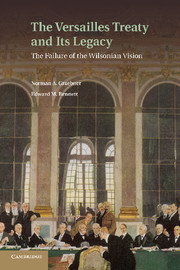Book contents
- Frontmatter
- Contents
- Preface
- 1 The International Order on Trial
- 2 The Road to Paris: 1917???1918
- 3 Versailles: A Study in Arrogance
- 4 The Retreat to Utopia
- 5 Manchuria and the Triumph of Non-Recognition
- 6 The Rise of Hitler
- 7 Challenge of the Dictators
- 8 The Elusive Response
- 9 Munich: The Continuing Escape from Reality
- 10 The Road to Prague
- 11 The Soviet Quest for Collective Security
- 12 The Coming of War: 1939
- Bibliography
- Index
- References
4 - The Retreat to Utopia
Published online by Cambridge University Press: 07 October 2011
- Frontmatter
- Contents
- Preface
- 1 The International Order on Trial
- 2 The Road to Paris: 1917???1918
- 3 Versailles: A Study in Arrogance
- 4 The Retreat to Utopia
- 5 Manchuria and the Triumph of Non-Recognition
- 6 The Rise of Hitler
- 7 Challenge of the Dictators
- 8 The Elusive Response
- 9 Munich: The Continuing Escape from Reality
- 10 The Road to Prague
- 11 The Soviet Quest for Collective Security
- 12 The Coming of War: 1939
- Bibliography
- Index
- References
Summary
I
America’s involvement in the Great War demonstrated graphically the role of U.S. economic and military power in the affairs of the world at war. Diplomatic tradition properly understood and applied, presented the only program available to sustain the hard-won peace. But Woodrow Wilson’s vision of a new world order, based primarily on democratic and judicial procedures, was designed specifically to eliminate both force and an accommodating diplomacy as the essential, historical ingredients in international peace and stability. Wilson defied history and experience in his assumption that he had actually created a new world order through the negotiations at Versailles and the resulting treaty. Certainly the British and French negotiators did not really agree with Wilson’s perception of what had been accomplished there, but tragically they all behaved as if the new world order had actually been achieved and universally accepted thereafter, and assumed that this world order needed only the reliance of moral force to ensure its compliance. Realists in the British, French, and U.S. governments, and Maxim Litvinov in the Soviet government, warned that the treaty either needed revision or the implementation of collective security agreements to enforce it, or both, but to no avail. These people understood that what provided the president his fleeting moment of leadership in world affairs was not his appealing design for a peaceful future, but the fact that he led a country with a remarkable capacity to wage total war – indeed, the nation that had made the defeat of Germany possible.
- Type
- Chapter
- Information
- The Versailles Treaty and its LegacyThe Failure of the Wilsonian Vision, pp. 67 - 88Publisher: Cambridge University PressPrint publication year: 2011



